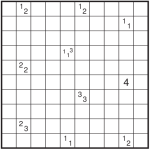This August, the Indian team was in London for the World Sudoku and Puzzle Championships. I have been recapping my personal experiences there, and I will continue to do so, with two parts left in the series. However, it is now time to draw attention to one of the ideas that came up during our discussions in London.
A little background first. In 2012, the Indian Sudoku team was decided by the Times Sudoku Championship (A National-level event conducted by Logic Masters India and The Times of India) for the first time (Previously, it was decided by the Indian Sudoku Championship, organized solely by LMI). Though I would definitely do things differently on the publicity side, and I think it could’ve been a whole lot better, the partnership did cause a substantial increase in participation, going from hundreds to thousands.
The problem is, there aren’t that many new regular Sudoku enthusiasts coming out of it. Especially now Rohan Rao, Rishi Puri and myself seem to be, without doubt, the best three players in India, switching orders in different competitions over the last two years. Sumit Bothra, Jaipal Reddy, Gaurav Korde, Rakesh Rai, Ritesh Gupta etc. are all great Sudoku solvers who are regularly in the top 10, but there aren’t many new faces.
There are many opinions on why this is the case, but for the purpose of this blog post, I’ll put my own out there: It is quite simply because, at the stage where there is highest participation, there isn’t any exposure to the level at which the Sudoku regulars practice. By the time the National Finals with higher variety and difficulty takes place, only the old guard make it. However, this isn’t a problem with an easy solution – you cannot make the earlier round hard as that would demoralize newcomers pretty quickly, and you want a fun event first and foremost. The only solution seems to be to increase the numbers that make the finals, and since it is the sponsors who will need to make added expenditure to transport the finalists, the final decision in this case has to be theirs.
Either way, for any enthusiast thinking it is too difficult to step up into the top Indian ranks, well obviously it isn’t (and shouldn’t be) easy, but it is very much possible to make a quick ascent. Just look at the most recent climbers – myself around 2012, and Kishore Kumar now. The path for both of us has been similar in the sense that we both were regular in online competitions which mimicked the standards of the World Championships. We may have been bad at the new variants at the start, but that’s definitely the level to practice at, and will mostly help to break into the top ranks.
This is where Sudoku Mahabharat comes in (quick clarification – depending on the success of this event, we DO hope to have a Puzzle Mahabharat as well in future years). Is this the only plan to give an opportunity to new talent? No, and there will be other projects announced. But the novelty of this tournament does address some issues. First and foremost, this tournament is organized by some of the regulars of the Indian teams that have been going to the World Championships in recent years. This means most of the top solvers are not competing. The aims of the competition, in relevance to the issues above, are as follows:
1. A competitive format is offered here, and the importance of this can never be understated. Solving a single Classic on a publication or website is different from solving a group of them in a timed format. There is a challenge in both areas, but the National and World Championships are built on a competitive multi-Sudoku timed-round environment. In such an environment, there is room to improve even in Classics for a Sudoku enthusiast.
2. This tournament will provide a look into the variations that appear at higher levels, in a categorized format to help in understanding them. It will also provide both an easy sample of the variant and a more difficult, regular sized version of the variant. The newcomers will have a chance to try out new variants in the easier format, and later move on to the harder levels of the same variants. This structure ensures that every participant has a fun challenge to look forward to.
3. To give new talent the chance to shine in a National level competition. There is hope that this will further encourage the winner to participate more regularly.
So here’s an invite to all Indian Sudoku enthusiasts to a great opportunity. Please visit the following pages to know more about the event, which will also feature an offline final in 2015.
The main Sudoku Mahabharat page: http://logicmastersindia.com/SM/2014-15.asp
The Sudoku Mahabharat Discussion thread: http://logicmastersindia.com/forum/forums/thread-view.asp?tid=868
The first round, with Standard Variations, by Rishi Puri, which starts on the 20th of September: http://logicmastersindia.com/SM/201409/
Also, if you want to support LMI in its various projects, please consider being a patron to the group. To know more, please visit this page: http://www.patreon.com/logicmastersindia










